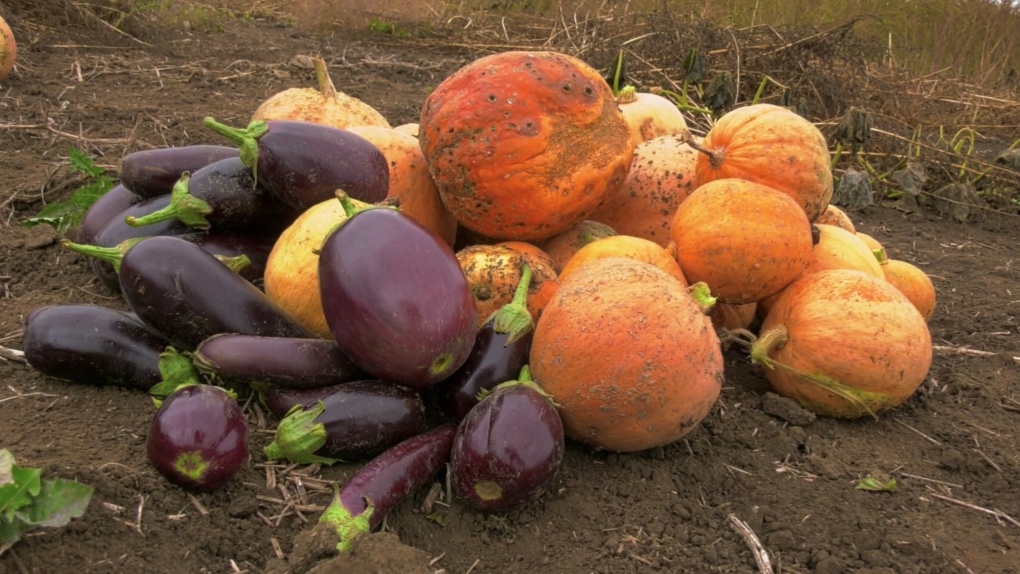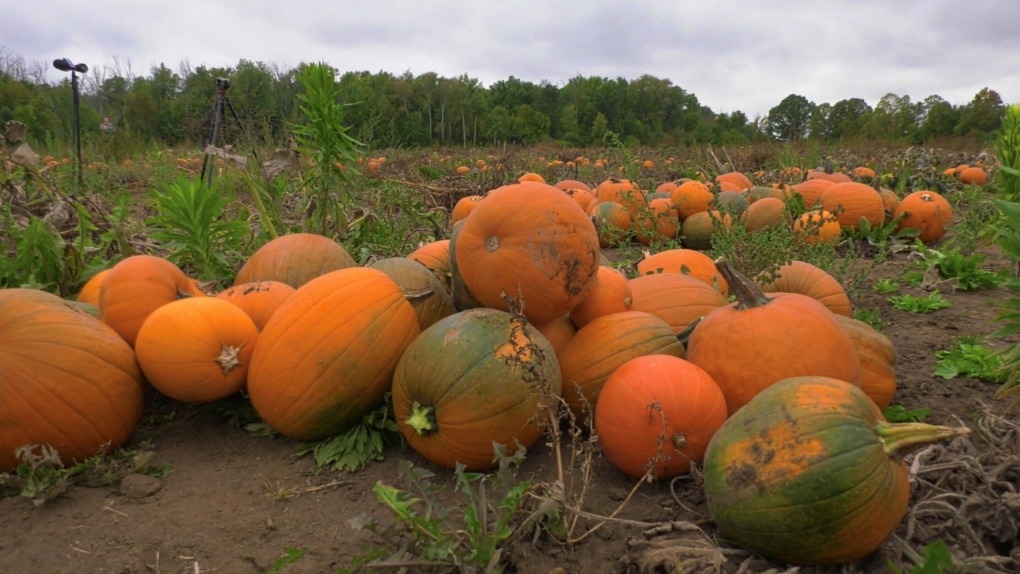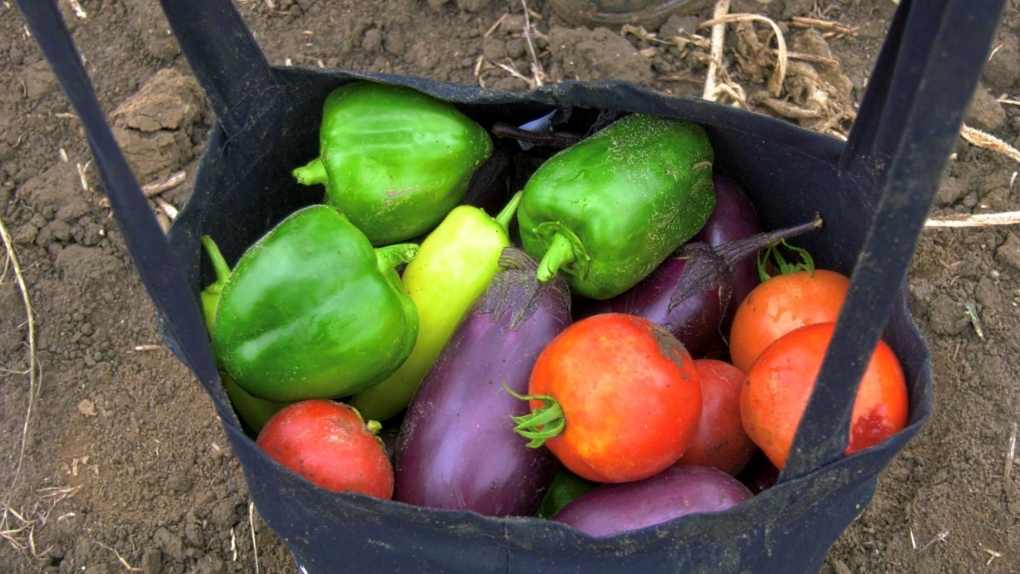Reconciliation garden in Breslau ready for harvest
On this National Day for Truth and Reconciliation, a unique local partnership is being celebrated in the name of promoting reconciliation. A growing garden in Breslau, aimed at nurturing relationships and reconciliation, is bringing together members of the community and volunteers to pick produce that will go towards feeding local Indigenous families.
Work on the garden began earlier this year and since then, a partnership between the local Indigenous community and Roman Catholic Church has blossomed.
What started out as nearly 10 acres of weeds, is now home to traditional Indigenous food and medicine such as pumpkins, squash, cedar, sage and sweet grass.
 A reconciliation garden that has been growing for months in Breslau is now ready for harvest. (Spencer Turcotte / CTV News)
A reconciliation garden that has been growing for months in Breslau is now ready for harvest. (Spencer Turcotte / CTV News)
It all began by planting the seed of an unlikely partnership. The land was provided by the Diocese of Hamilton, which is affiliated with St. Mary’s Roman Catholic Church in Kitchener. The church and Anishnabeg Outreach joined forces to create the garden and offer what grows there to local Indigenous peoples in need.
“We now support 450 families and growing,” said Stephen Jackson, Anishnabeg Outreach’s CEO.
While the garden has grown, so has the relationship between the two sides.
“If you look at our past, it's not that great. So that they're interested -- that is edifying for me because I don't know if I would do the same. (Or) if I would have the courage or the desire,” said Father Toby Collins from St. Mary’s Roman Catholic Church.
 A reconciliation garden that has been growing for months in Breslau is now ready for harvest. (Spencer Turcotte CTV News)
A reconciliation garden that has been growing for months in Breslau is now ready for harvest. (Spencer Turcotte CTV News)
It’s hard to ignore the rows of pumpkins at the garden. Those who have working in the sea of orange for months said it speaks to the bigger picture of what the garden represents when it comes to truth and reconciliation.
“If you work together, learn together or play together, you're able to break down the barriers of discrimination and racism and that's what this is all about. It's helping people participate,” explained Jackson.
 Vegetables growing in a reconciliation garden in Breslau are ready for harvest. (Spencer Turcotte/CTV News)
Vegetables growing in a reconciliation garden in Breslau are ready for harvest. (Spencer Turcotte/CTV News)
That participation has branched out to local businesses like The Neighbourhood Group, which saw this as an opportunity for some growth of their own.
“One of the simplest things you can do is get your hands dirty and go volunteer. And it's amazing where the conversations will go and where you'll start to see a path,” said Court Desautels, CEO of The Neighbourhood Group.
Clearing a path for the 10-acre garden may have seemed daunting at first, but the progress made is clear in more ways than one.
Today, members of the community harvested crops that will help fill care packages. It is part of the Spirit Bundle Program which supports Indigenous families in the Waterloo region and Guelph area.
The group says it's a way to build relationships and demonstrate reconciliation in a real way.
“If we just look at all of them, that's the healing. It's about building partnerships, building relations for a future that's different. And today, on Truth and Reconciliation Day, I can't tell you how important this is," said Jackson.
"It's one of the many expressions that we can do to show that we care about Indigenous people today and about what's happened in the past so that we can walk through it to create a different present and future. One that is a lot more giving and more respectful of each other's traditions," said Father Toby Collins.
Although a big part of the Spirit Bundle Program is food-based, the group is also looking for other donations to help fill packages including cleaning supplies, diapers, toiletries, children's clothing and toys.
Donations can be dropped off at their location at 236 Woodhaven Road in Kitchener.
CTVNews.ca Top Stories

Much of Canada is under a weather alert this weekend: here's what to know
From snow, to high winds, to extreme cold, much of Canada is under a severe weather alert this weekend. Here's what to expect in your region.
'I gave them a call, they didn't pick up': Canadian furniture store appears to have gone out of business
Canadian furniture company Wazo Furniture, which has locations in Toronto and Montreal, appears to have gone out of business. CTV News Toronto has been hearing from customers who were shocked to find out after paying in advance for orders over the past few months.
Fugitive U.S. rioter seeks asylum in Whistler amid warnings of more to come
An American citizen convicted of participating in the Jan. 6, 2021, riot on Capitol Hill and dodging jail time in Whistler may just be the start of an asylum-seeking rush, according to a prominent legal expert.
Prince William expresses sadness at death of his former nanny's stepson in New Orleans attack
Prince William expressed his shock and sadness Saturday at the news of the death of his former nanny's stepson in the New Year's truck attack in New Orleans that killed 14 people.
Thirty years on, is Quebec headed for another independence referendum?
On the eve of the 30th anniversary of Quebec's second independence referendum -- the first one was in 1980 -- it seems the tide could be turning again. Legault is deeply unpopular after six years in power, and the Parti Quebecois, with a young, charismatic leader, has been ahead in the polls for more than a year.
Soldier who died by suicide in Las Vegas told ex-girlfriend of pain and exhaustion after Afghanistan
The highly decorated Special Forces soldier who died by suicide in a Cybertruck explosion on New Year's Day confided to a former girlfriend who had served as an Army nurse that he faced significant pain and exhaustion that she says were key symptoms of traumatic brain injury.
Man arrested after committing five bank robberies in 10 days: Toronto police
A man accused of robbing five Toronto-area banks in a 10-day period has been arrested by Toronto police.
Four puppies abandoned in northern Ont. rescued, rehomed
On New Year's Day, a pair had gone for a drive on northern Ontario backroads near Markstay-Warren to look at the local wildlife when they came upon four puppies in the middle of the road in the cold.
Calgary woman stranded in Mexico after husband's death during diving trip
A Calgary woman is struggling to return home after her husband died while diving in Mexico, leaving her stranded and facing financial hardship.

































